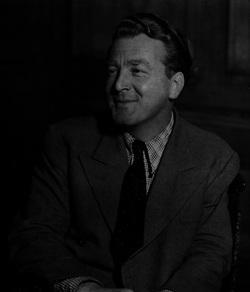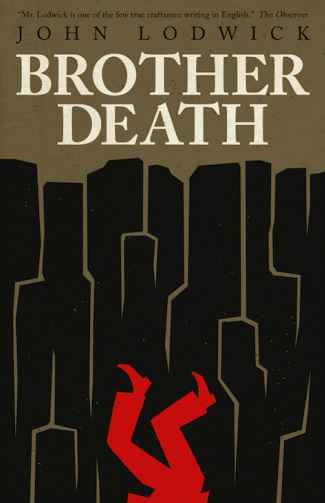|
BOOK DETAILS
Trade paper ISBN-13: 978-1939140852 List Price: $18.99 U.S. Pages: 222 Published: 2013 |
Brother Death (1948)
John Lodwick With a new introduction by Chris Petit Book Description
Totally devoid of principles or moral scruples, Eric Rumbold was the perfect agent for the British during the war, adept as a spy, killer and saboteur. Now he is a mercenary adventurer, adrift in the back streets of Marseilles, making a precarious living as a black marketeer. When he meets the lovely Fiona Lampeter, she knows she’s found the man she’s been looking for. A young boy stands in the way of her inheriting the family fortune: she wants him dead and is willing to make it well worth Rumbold’s while. Drawn into Fiona’s family’s web of intrigue and deceit, Rumbold lays the plans for the horrific and cold-blooded murder of an innocent child . . . and in the novel’s unforgettable climax, at least one character will make the acquaintance of Brother Death! One of the best selling authors of his day, John Lodwick wrote seventeen novels characterized by their fast pace, sardonic humour and brilliant prose. Though admired by Somerset Maugham and Anthony Burgess and compared with Graham Greene and Evelyn Waugh, Lodwick fell into obscurity after his untimely death in 1959 at age 43. This edition of Brother Death (1948) is the first republication of any of his novels since his death and includes a new introduction by Chris Petit. |
reviews
“Brother Death is perhaps John Lodwick’s most original and ambitious thriller, combining the moral questioning of Graham Greene with the edge-of-your-seat suspense of Geoffrey Household or Hitchcock.” – Michael Moorcock
“Mr. Lodwick writes with great accomplishment, softening his brutalities with a sardonic humour.” – Lionel Hale, Observer
“Mr. Lodwick is a clever writer who goes all out to be tough. It should gratify him to hear that this reviewer thinks Brother Death a perfectly horrid book, for he can hardly have meant it to be anything else. . . . there is no denying that Mr. Lodwick’s style is admirable, that he can make a point with the minimum of words and can be very good company.” – Guardian
“[O]ne of the wittiest and most original talents of his generation.” – Peter Green, Telegraph
“John Lodwick has a richness of invention and a command of words equal to Evelyn Waugh.” – Daily Herald
“Mr. Lodwick writes with great accomplishment, softening his brutalities with a sardonic humour.” – Lionel Hale, Observer
“Mr. Lodwick is a clever writer who goes all out to be tough. It should gratify him to hear that this reviewer thinks Brother Death a perfectly horrid book, for he can hardly have meant it to be anything else. . . . there is no denying that Mr. Lodwick’s style is admirable, that he can make a point with the minimum of words and can be very good company.” – Guardian
“[O]ne of the wittiest and most original talents of his generation.” – Peter Green, Telegraph
“John Lodwick has a richness of invention and a command of words equal to Evelyn Waugh.” – Daily Herald
ALSO AVAILABLE THROUGH ONLINE RETAILERS
AUTHOR BIOGRAPHY

John Lodwick was born at Cheltenham, Gloucestershire in 1916. His father died at sea before his birth, and Lodwick was raised by his young mother and his grandfather. After spending most of his infancy in India, Lodwick was sent at age 8 to Cheltenham College preparatory school, where he acquired a penchant for British naval history, a hobby that led his guardians to dispatch him into the Royal Navy. He attended the Royal Naval College of Dartmouth, and after spending some time at sea, Lodwick left the Navy at age 18 to become a writer. His literary agent, Curtis Brown, encouraged him to experience more of life before attempting to write novels, and he accordingly relocated to Dublin for three years, where he was an advertising agent, journalist, and playwright.
When the Second World War broke out, Lodwick was living in France, and he immediately volunteered for the French army, serving in the Foreign Legion. His first novel, Running to Paradise (1943), drew on his wartime experiences and won the $1,000 War Novel Prize.
Between 1943 and 1960, sixteen more novels followed, as well as works of nonfiction and autobiography. Lodwick’s prolific output included war novels, thrillers, adventure novels, and comic fiction; most of his works were published both in England and America and many of them were translated into foreign languages. During the 1940s and ’50s, Lodwick was one of the top sellers for publisher William Heinemann on a list that also included Somerset Maugham, J. B. Priestley, and Graham Greene. Critical reactions to Lodwick’s books were mixed. Though reviewers were unanimous in praising his fine style, wit, and sardonic humour, he was sometimes rebuked for the cynical tone of his books and the unpleasantness of his characters. Nonetheless, his many admirers included Maugham, John Betjeman, and Anthony Burgess.
John Lodwick died at age 43 in 1959 in a car crash in Spain. At the time of his death, he had been working on a volume of autobiography, a fragment of which was published posthumously as The Asparagus Trench (1960) to rave reviews, with critics agreeing that, had it been completed, it would have ranked as one of the great autobiographies of its time.
In The Novel Now (1967), Burgess warned that because of Lodwick’s early death, he was in danger of being neglected, and as D.J. Taylor has noted more recently, Lodwick’s “doomy romanticism” may have felt out of place in the 1960s alongside the realistic, working-class fiction that was then in vogue. A few admirers, including Iain Sinclair, Michael Moorcock, Chris Petit, and Patrick Wright, have tried to keep Lodwick’s reputation alive in recent years, and it is to be hoped that Valancourt’s republication of Lodwick will lead to his rediscovery.
When the Second World War broke out, Lodwick was living in France, and he immediately volunteered for the French army, serving in the Foreign Legion. His first novel, Running to Paradise (1943), drew on his wartime experiences and won the $1,000 War Novel Prize.
Between 1943 and 1960, sixteen more novels followed, as well as works of nonfiction and autobiography. Lodwick’s prolific output included war novels, thrillers, adventure novels, and comic fiction; most of his works were published both in England and America and many of them were translated into foreign languages. During the 1940s and ’50s, Lodwick was one of the top sellers for publisher William Heinemann on a list that also included Somerset Maugham, J. B. Priestley, and Graham Greene. Critical reactions to Lodwick’s books were mixed. Though reviewers were unanimous in praising his fine style, wit, and sardonic humour, he was sometimes rebuked for the cynical tone of his books and the unpleasantness of his characters. Nonetheless, his many admirers included Maugham, John Betjeman, and Anthony Burgess.
John Lodwick died at age 43 in 1959 in a car crash in Spain. At the time of his death, he had been working on a volume of autobiography, a fragment of which was published posthumously as The Asparagus Trench (1960) to rave reviews, with critics agreeing that, had it been completed, it would have ranked as one of the great autobiographies of its time.
In The Novel Now (1967), Burgess warned that because of Lodwick’s early death, he was in danger of being neglected, and as D.J. Taylor has noted more recently, Lodwick’s “doomy romanticism” may have felt out of place in the 1960s alongside the realistic, working-class fiction that was then in vogue. A few admirers, including Iain Sinclair, Michael Moorcock, Chris Petit, and Patrick Wright, have tried to keep Lodwick’s reputation alive in recent years, and it is to be hoped that Valancourt’s republication of Lodwick will lead to his rediscovery.

